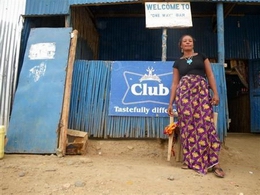 "On average the African continent (in terms of GDP) will grow 5-6 percent per annum we think ... we would expect to capture maybe 2-3 percent (beer volume sales) above that," SABMiller Africa's Finance Director Jonathan Kirby told the Reuters Africa Investment Summit in the Nigerian capital Abuja.
"On average the African continent (in terms of GDP) will grow 5-6 percent per annum we think ... we would expect to capture maybe 2-3 percent (beer volume sales) above that," SABMiller Africa's Finance Director Jonathan Kirby told the Reuters Africa Investment Summit in the Nigerian capital Abuja.Kirby said the world's second-largest brewer plans to invest $400 million to $500 million a year outside South Africa and open one to two new breweries in Africa in each of the next three years, with countries such as Ghana, Nigeria, Mozambique and Zambia the likely targets for expansion.
Home to some of the world's fastest growing economies, Africa's thirst for beer is surging: analysts estimate beer volumes rose around 7 percent last year. Excluding the mature South African market, growth reached more than 10 percent.
This growth is spurring increased competition. SABMiller wants to gain an edge over rivals like Diageo (DGE.L) and Heineken (HEIN.AS) by luring consumers who drink cheap locally made home brew that comprises 75 percent of alcohol consumed in the region, according to company estimates.
African consumers pay more for beer brands than the global average, Kirby said, despite being the poorest continent.
"I think price is a key area. The African consumer will pay on average about $1 a serve and if you benchmark that against the rest of the globe that is at the top end," he said.
"If we could make beer say 80-85 cents a serve I think the volume opportunity would just jump at you."
Kirby said the company was looking at using cheaper local crops to make its beer and providing more draft beer to cut the cost of packaging. This has the double effect of reducing its import bill and stimulating local economies, which gives the company more opportunity to negotiate with governments on taxes.
"One of the things we want to try and do is develop a long term local supply structure (to reduce) our reliance on expensive imported and highly tariffed crops," Kirby said.
He said SABMiller currently gets around 30 percent of its supplies locally but plans to increase this to 50 percent within the next 2-3 years.
SABMiller began selling a beer using the starchy root cassava in Ghana last month. It mirrors a similar product launched in Mozambique in 2011, where SABMiller was able to negotiate a reduced excise tax on the cassava and produce a brew 75 percent cheaper than other mainstream beers.
Kirby said the cassava brew now makes up 8 percent of the beer consumed in Mozambique.
Nigeria, Africa's most populous nation with around 170 people, in which Diageo and Heineken are vying for dominance, is the biggest producer of cassava in the world. Kirby said it was a less viable business there because Nigeria already has low excise on the root.





